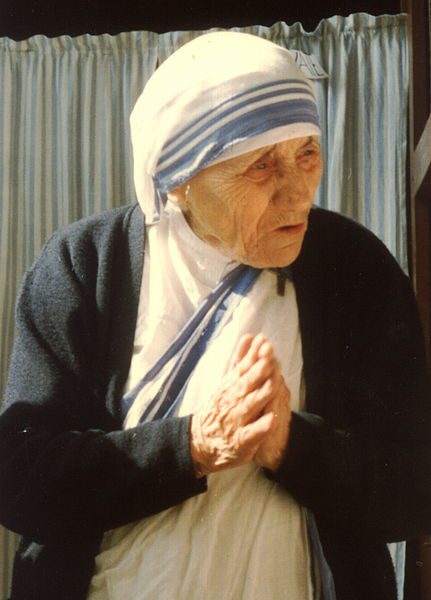“If I ever become a saint, I will surely be one of ‘darkness.’ ”
– Blessed Teresa of Calcutta
They say she is a saint.
And on September 4th, 2016, Pope Francis and the Catholic Church will canonize her. On that day, Mother Teresa – Blessed Teresa of Calcutta – will become St. Teresa of Calcutta.
They say she is a saint.
But some doubt it.
Oh, it’s not simply that some question the Catholic Church’s overall process of investigating Mother Teresa’s (or any other candidate’s) cause for sainthood (including identifying and verifying two miracles attributed to the proposed saint’s intercession). Nor is it because of cynical detractors who have tried to characterize the diminutive nun as some sort of narcissistic tyrant reveling in the misery around her.
No.
Some doubt that she is a saint…because she doubted.
The world came to know the depth of Blessed Teresa’s spiritual “dark night” when her personal letters, including deeply troubled missives to spiritual advisers, came to light in the posthumously published collection, Mother Teresa: Come Be My Light. From those letters emerged the desperation from years of service in the squalor, the angst and the hopelessness of the Calcutta gutters. From those letters came abandonment, desolation, blackness.
“Darkness is such that I really do not see – neither with my mind nor with my reason – the place of God in my soul is blank – There is no God in me – when the pain of longing is so great – I just long & long for God… The torture and pain I can’t explain.”
“There is so much deep contradiction in my soul. Such deep longing for God – so deep that it is painful – a suffering continual – and yet not wanted by God – repulsed – empty – no faith – no love – no zeal. Souls hold no attraction – Heaven means nothing – to me it looks like an empty place – the thought of it means nothing to me and yet this torturing longing for God. Pray for me please that I keep smiling at Him in spite of everything. For I am only His – so He has every right over me.”
Teresa’s was a dark night that lasted years. A spiritual desert place. A barren land bereft of hope.
Indeed.
Surely, it has been reasoned, this revelation makes Blessed Teresa vulnerable. Surely this bright light of Catholic faith and charity is snuffed out by her embarrassing weakness, by her scandalous hypocrisy. Surely this dark chapter should be whitewashed, or better yet, forgotten.
But we have seen this dark night before.
Mary, the Mother of Christ, gazed at her bloodied, beaten and crucified Son – her Child of the Anunciation, her Boy of the carpenter’s shop, her Son of wisdom and miracles. And surely, she recalled Simeon’s words to her at the Presentation of Christ to the Temple. “And you yourself a sword will pierce”. And a darkness surrounded her.
Peter, the Rock upon which the Church would be built, caught the telling gaze of Christ after denying Him for the third time. He removed himself to an isolated place and wept bitterly. And a darkness engulfed him.
Paul, haughtily “breathing murderous threats” against the disciples of Christ, fell on the road to Damascus. He was struck by a brilliant light and an indicting Voice. In that moment, he found the entirety of his life’s purpose shaken and upended. And for three days, darkness consumed him.
And Jesus Christ, God-made-man, asked for the punishing cup to be taken from Him when in the Garden of Gethsemane. And then, fixed to a cross, he desperately yearned to know why His God had forsaken Him. “It is finished.”, he uttered. And darkness would descend.
St. John of the Cross and St. Therese of Lisieux. G.K. Chesterton and Flannery O’Connor. All had dark nights.
A young Flannery, memorably, wrote in her prayer journal,
“Dear God, I cannot love Thee the way I want to. You are the slim crescent of a moon that I see and my self is the earth’s shadow that keeps me from seeing all the moon. The crescent is very beautiful and perhaps that is all one like I am should or could see; but what I am afraid of, dear God, is that my self shadow will grow so large that it blocks the whole moon, and that I will judge myself by the shadow that is nothing. I do not know You God because I am in the way. Please help me to push myself aside.”
And yet the fruits of prayer, time and experience – and of her dark nights of lupus and spiritual uncertainty – would allow a mature Flannery to offer this advice to a spiritually struggling college student,
“‘Lord I believe. Help my unbelief.’ It is the most natural and most humanizing and most agonizing prayer in the gospels, and I think it is the foundation prayer of faith.”
Yes. Yes.
You see, I’ve discovered that dark nights don’t disqualify saints. They make them. They are the foundation prayer of faith. And the dark nights I have seen in Christ and Mary, Peter and Paul, G.K. and Flannery, and… Blessed Teresa of Calcutta have helped me in dark nights of my own. We don’t need to run away from dark nights of the soul – ours or others. Rather, we should believe and hope and be purified by them. We should know that perhaps some good will come out of them – for us or others. As one wise writer once said, “Faith means believing in advance what only makes sense in reverse.”
Blessed Teresa, haunted by darkness, realized this. And wrote of it.
“If my separation from you brings others to you… I am willing with all my heart to suffer all that I suffer. Your happiness is all I want.”
They say that Blessed Teresa of Calcutta is a saint.
I believe it.
The Saint of the Darkness…who brings others to the Light.
—————————-
Photo Credit: Evert Odekerken at Wikimedia Commons













